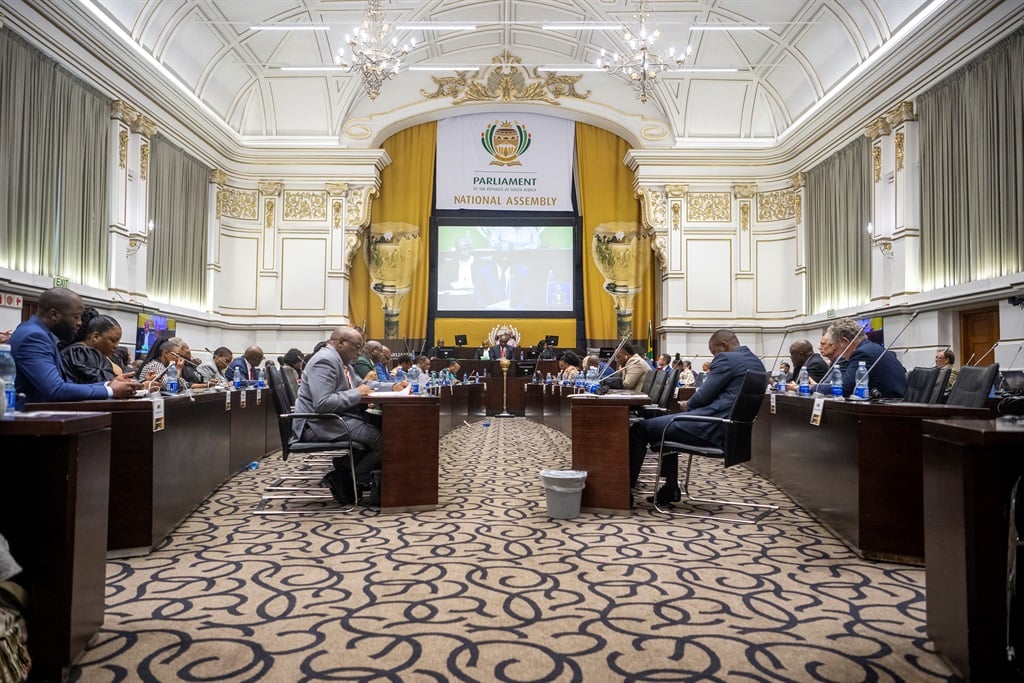
Restrictive laws such as the General Intelligence Laws Amendment Bill would impede the freedoms of a vibrant civil society that has worked tirelessly to hold the government accountable, write Gabriel Klaasen and Busisiwe Zasekhaya.
When civil society organisations and groups begin to be put under surveillance, and networks and coalitions that work to support people and hold the government accountable face the possibility of being declared unlawful, can we really say we live in a country that values the constitutional freedoms and human rights of its people?
With South Africa building up to the 2024 national elections, we see the country facing one of its most significant decisions. It leaves South Africans asking a very important question: Who do I vote for? While some have already given up on the country, many still have hope for it. Some may argue that this hope is misguided, but in fact, it is the last thing holding the country together.
We see this hope in the kindness of our neighbours and communities - seen more explicitly during the Covid-19 lockdown period, where it was not the government that was first responders but fellow community members. We see this hope in our youth, many of whom have been given this massive responsibility to fix a country that they had no part in corrupting, yet continue to stand up in many sectors against injustice. We also see this hope in the way that we gather, build partnerships, and collaborate.
Rights violated
We see it in civil society with people with common goals and interests to further develop democratic ideals. Sadly, this hope, much like the last candle during load shedding is burning out fast, and we are watching our decision-makers, who should be doing all they can to protect and foster it, allowing it to die out.
Across the world, civil society and human rights defenders find themselves being threatened and under attack. Instead of the protection of democratic freedoms at work, of a culture of accountability through an active citizenry, time and time again we witness the complete opposite.
These trends are witnessed in both authoritarian and democratic countries where the human rights and basic freedoms of activists have been and continue to be violated on a regular basis.
A 2016 discussion paper commissioned by international human rights organisations noted that "[c]ivil-society organisations continue to address… grievances and consequently become themselves victims of repression and violence perpetrated by both state and non-state groups, and are subjected to restrictions through legal initiatives and administrative action". Sadly, since then, this has become something more and more common across the world.
READ | ANALYSIS: Draconian new Intelligence Bill - A three-point blueprint for State Capture 3.0
We see it in India, where there is a looming threat to democracy with the 'growing authoritarianism', gross human rights violations in areas like Kashmir, and censorship - seen in the unwarranted arrest of Indian activist Disha Ravi in 2021 over the creation of a farmers' protest 'toolkit'. And in Eqypt, where pro-democracy and human rights activist Alaa Abd el-Fattah, was arrested for "violating protest laws" for the better part of the last decade.
While these two activists are named here, they are by no means the only ones - in their countries or around the world. In fact we may even see it here in South Africa with the emergence of The General Intelligence Laws Amendment Bill (the GILAB 2023). According to Intelwatch, this is a new Bill "amending the powers and mandate of South Africa’s state intelligence services."
The South African State Security Agency already has a history of placing civil society organisations and movements under surveillance. We now know that civil society organisations and student movements are already unlawfully monitored and, in some instances, infiltrated by state security agents.
Dorr opened for monitoring
This has had a chilling effect on people’s ability to organise and build solid movements in a shrinking civic space, where those who dare to voice their dissent are actively being targeted. Activists have repeatedly raised alarms about their lives being in danger.
The GILAB 2023 is a response to recommendations from the Zondo Commission's Judicial Commission of Inquiry into Allegations of State Capture report, among others. While on first appearance, it aims to address the urgent need to reform the laws governing South Africa's intelligence services, what it actually does is open the door for civil society in South Africa to be monitored and struck down should the need arise without actually addressing broader concerns in the reports it draws from.
READ | ANALYSIS: Ntshavheni's remarks about NGOs cut deeper than mere blame-shifting
The extensive surveillance capabilities raise massive concerns regarding the freedom to associate - a right enshrined in both the South African Constitution and the Universal Declaration of Human Rights as an essential human right.
What this would look like for civil society is a myriad of barriers that challenge the freedoms, autonomy, as well as the independent accountability role it plays with government. It may require the vetting of people starting or operating NGOs or religious organisations by the state security agency. This would put people in these spaces in the same category as people with access to state secrets and national key points. This vetting process would also include access to financial and health information, the surveillance of communications, and polygraph testing.
All these would threaten civil societies' critical role in ensuring we have the transparency and accountability we need and demand from our government. It is because of this that we, as civil society, need to call for meaningful reforms that safeguard our democratic rights.
South Africa is a country that was built on hope of freedom and with courage from people bold enough to fight for it. These activists and changemakers fought for that justice and change that resulted in our very first democratic election 29 years ago - almost three decades ago.
It is because of these activists who fought for the freedoms and rights we have today, both of which should be safeguarded as much as possible, that we can ensure that we can freely without risk or fear of censorship, intimidation, or imprisonment call out the injustices and wrongdoings in and by our government. Today, many South Africans pride themselves on our vibrant democracy and active citizenry.
So, in the build-up to our 30-year commemoration of 'freedom’, let us not only ask the question, Who do we vote for? But who is building on that hope we were conceptualised on, and how can we as civil society, as communities, as a people continue and build on the acts of courage those before us actioned to ensure we do not perish and do not lose hope.
Restrictive laws such as the GILAB 2023 would impede the freedoms of a vibrant civil society that has worked tirelessly to hold the government accountable. We urge you to join us and other organisations in taking a stand against the GILAB to protect our democracy. Endorse a statement by a civil society organisation calling for the withdrawal or redrafting of the GILAB here to ensure it meets constitutional standards that protect our rights and freedoms instead of threatening them.
- Gabriel Klaasen is the Communications Coordinator for Project 90 by 2030, and a Programmes Manager for African Climate Alliance.
- Busisiwe Zasekhaya is a coordinator of the Climate Justice Coalition.
*Want to respond to the columnist? Send your letter or article to opinions@news24.com with your name and town or province. You are welcome to also send a profile picture. We encourage a diversity of voices and views in our readers' submissions and reserve the right not to publish any and all submissions received.
Disclaimer: News24 encourages freedom of speech and the expression of diverse views. The views of columnists published on News24 are therefore their own and do not necessarily represent the views of News24.




 Publications
Publications
 Partners
Partners























